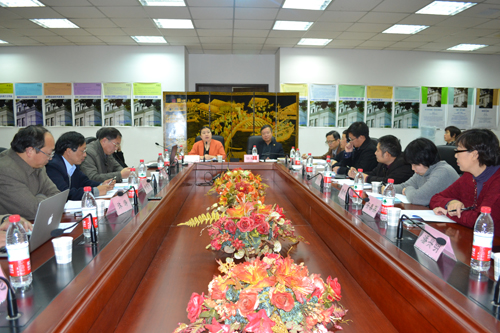|
 |
|
"Symposium on Eastern African Historical and Cultural Studies" was hosted by East China Normal University in Shanghai on December 15, 2012 (LIU JIAN) |
Li Anshan, President of the Chinese Society of African Historical Studies, is a well-known Chinese scholar who has dedicated himself to African studies for more than 30 years. He has witnessed the development of African studies in China over the years.
"In the 1980s, there were very few research institutions dedicated to Africa in the country," said Li.
As the ties between China and Africa grow, there is an increasing need for the Chinese Government, enterprises and individuals to know more about Africa. "This need has stimulated African studies in the country," Li said.
During the past three decades, domestic African studies institutions have increased from several to over 20. Centers for African studies have been established at Chinese universities one after another, while seminars, conferences and forums have also been frequently held to increase exchanges and dialogue between Chinese and African scholars.
"African studies in China has gradually moved away from its original political orientation to become a wide-ranging academic discipline," Li commented, adding that many scholars now focus on history, geography, economics, literature, ethnic studies and cultural studies.
African studies have also deepened as well. "As more scholars and students have opportunities to visit African countries, their analysis and views are getting closer to Africa's real conditions," he said.
Boom on campuses
Li is also director of both the Institute of Afro-Asian Studies and the Center for African Studies at Peking University (PKU), which is the forerunner in the field of African studies.
Scholars at PKU first took up African studies after the People's Republic of China was founded in 1949, and they have made pioneering contributions to African studies in China. The earliest Sino-African educational cooperation and academic exchanges were conducted between PKU and Cairo University of Egypt.
PKU's Center for African Studies is also one of the first institutions of this nature established on Chinese campus. As an interdisciplinary institute for comprehensive African research, it consists of teachers and research fellows from different departments and institutes at the university.
East China Normal University (ECNU) has a special focus on African historical and cultural studies, particularly in East Africa. Last December, the Symposium on Eastern African Historical and Cultural Studies was hosted at ECNU in Shanghai.
"We hold this conference with the aim of building an academic exchange platform for African historical and cultural studies, particularly those focusing on East Africa," said Mu Tao, Director of ECNU's Institute of African Studies.
"Basic research in fields like historical and cultural studies is important, because many practical questions in Africa have their roots in history," Mu told ChinAfrica. "One needs to look at history to understand Africa's current conditions and problems," he added.
"Historical and cultural studies on Africa help us to better understand the needs of African countries," said Sun Baohong, Deputy Director General of the African Department of the Ministry of Foreign Affairs at the conference.
|